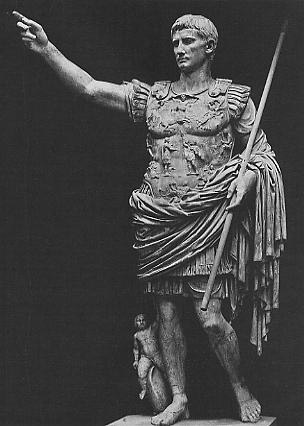The first factor I would like to examine is the army. Having conquored Antony and his consort Cleopatra, Augustus was in control of a massive amount of men. What was he to do with all of them? Normally, soldiers who had completed their time of service were given a piece of land as compensation for their dutiful service. This policy was carried out by Augustus: upon conquoring Egypt, he acquired substantial amounts of money. Thus, he was able to buy land for the soldiers instead of merely dispossessing people of it. This would no doubt be more favourable to those people who gave up their land for the soldiers. Also, Augustus instituted a policy whereby soldiers were paid in cash, which was obtained through the Egyptian treasuries as well as taxation, instead of the usual allottment of land. With the advent of this policy, Augustus managed to fill the requirements that soldiers demanded after they had finished bashing people over the heads. Not only this, but Augustus kept some soldiers in service, and created the praetorian guard. This force of soldiers was to become essential if the emperor wished to retain his position; they came to have a great deal of power in that they could assassinate emperors whom they were disinclined towards, and, in one case, having done so, auction off the position of emperor. At any rate, the policy of Augustus kept the army happy. A second factor also related to the army was Augustus' familial connection with Caesar. The army would have no doubt remembered fondly the triumphs of Caesar, and Augustus, being his great nephew, would have had been held in a light of distinction by the army.

A second factor which contributed to the success of Augustus is the language in which he framed his titles and honors, as well as the positions which he chose to hold. For example, through the years of 27 to 23 BC, he held power through a series of consulships. However, he soon realized that this was making him unpopular with the senatorial class; for they all aspired to attain the highest position available to them: that of consul, and with Augustus continually holding one of the two offices, the chances for the senators to reach this esteemed position were reduced. So, he decided to give up this position and instead hold the powers of a tribune for life (these powers were of course granted by the Senate). With this this tribunicia potestas (to be sure, he wasn't actually elected tribune of the plebs, but instead was accorded the powers thereof), Augustus had the power to call assemblies and veto the actions of magistrates. Not only this, but he was also subsequently given a series of powers and titles, including maior imperium, pater patriae, princeps, and pontifex maximus. It is the names of the titles which are essential here: they are all framed in the language of Republican Rome. Imperium basically means the power to act on behalf of the Roman state, and could be granted to generals, for example, in Republican times. Augustus is merely the "greater imperium", meaning his ability to act on behalf of Rome extended throughout the Empire. Princeps comes from an office in the Republic, the princeps senatus, "first of the Senate". This was more of an honorary position and had no real powers, but, if one held it, they were recognized as being the go to person for disputes and advice. Pontifex maximus was the principal religious office, and dealt with issues of state religion. All of these come, in one way or another, from the Republic. Also important to note is the show of modesty Augustus put on when he recieved his powers. He appeared to accept the powers unwillingly, which most likely made a big impact on the Senate and the populace at large, if they knew what was going on at all.
In the words of Gibbon "he solemnly restored the senate and people to all their ancient rights; and wished only to mingle with the crowd of his fellow citizens, and to share the blessings which he had obtained for the country."


No comments:
Post a Comment